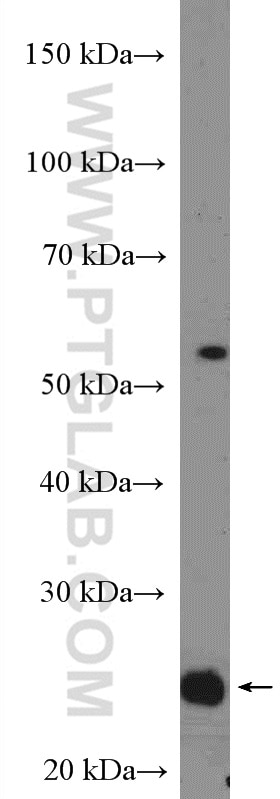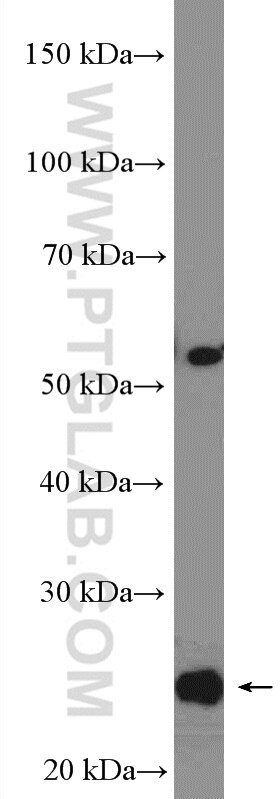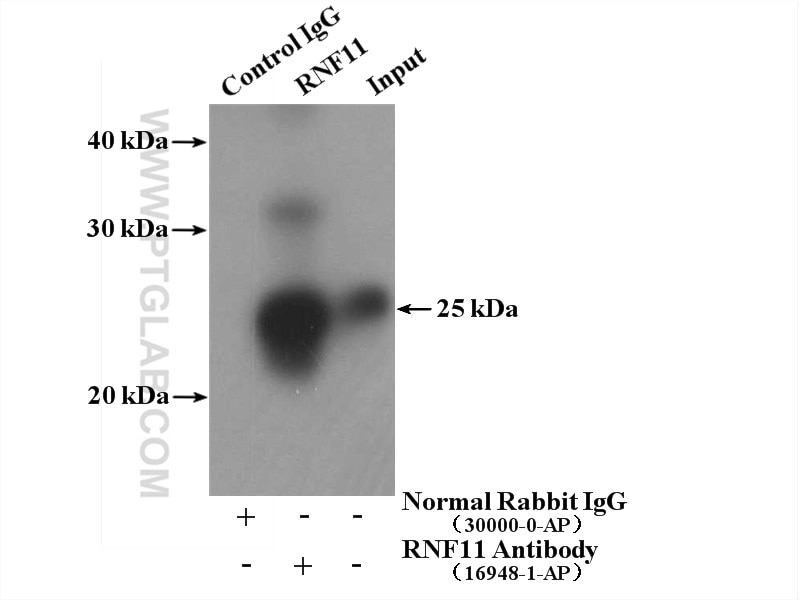Tested Applications
| Positive WB detected in | mouse brain tissue |
| Positive IP detected in | mouse brain tissue |
Recommended dilution
| Application | Dilution |
|---|---|
| Western Blot (WB) | WB : 1:500-1:1000 |
| Immunoprecipitation (IP) | IP : 0.5-4.0 ug for 1.0-3.0 mg of total protein lysate |
| It is recommended that this reagent should be titrated in each testing system to obtain optimal results. | |
| Sample-dependent, Check data in validation data gallery. | |
Published Applications
| IF | See 1 publications below |
Product Information
16948-1-AP targets RNF11 in WB, IP, IF, ELISA applications and shows reactivity with human, mouse, rat samples.
| Tested Reactivity | human, mouse, rat |
| Cited Reactivity | human |
| Host / Isotype | Rabbit / IgG |
| Class | Polyclonal |
| Type | Antibody |
| Immunogen |
CatNo: Ag10563 Product name: Recombinant human RNF11 protein Source: e coli.-derived, PGEX-4T Tag: GST Domain: 1-154 aa of BC020964 Sequence: MGNCLKSPTSDDISLLHESQSDRASFGEGTEPDQEPPPPYQEQVPVPVYHPTPSQTRLATQLTEEEQIRIAQRIGLIQHLPKGVYDPGRDGSEKKIRECVICMMDFVYGDPIRFLPCMHIYHLDCIDDWLMRSFTCPSCMEPVDAALLSSYETN Predict reactive species |
| Full Name | ring finger protein 11 |
| Calculated Molecular Weight | 154 aa, 17 kDa |
| GenBank Accession Number | BC020964 |
| Gene Symbol | RNF11 |
| Gene ID (NCBI) | 26994 |
| RRID | AB_2878335 |
| Conjugate | Unconjugated |
| Form | Liquid |
| Purification Method | Antigen affinity purification |
| UNIPROT ID | Q9Y3C5 |
| Storage Buffer | PBS with 0.02% sodium azide and 50% glycerol, pH 7.3. |
| Storage Conditions | Store at -20°C. Stable for one year after shipment. Aliquoting is unnecessary for -20oC storage. 20ul sizes contain 0.1% BSA. |
Protocols
| Product Specific Protocols | |
|---|---|
| IP protocol for RNF11 antibody 16948-1-AP | Download protocol |
| WB protocol for RNF11 antibody 16948-1-AP | Download protocol |
| Standard Protocols | |
|---|---|
| Click here to view our Standard Protocols |
Publications
| Species | Application | Title |
|---|---|---|
Cancer Res A20/TNFAIP3 Regulates the DNA Damage Response and Mediates Tumor Cell Resistance to DNA-Damaging Therapy. |








